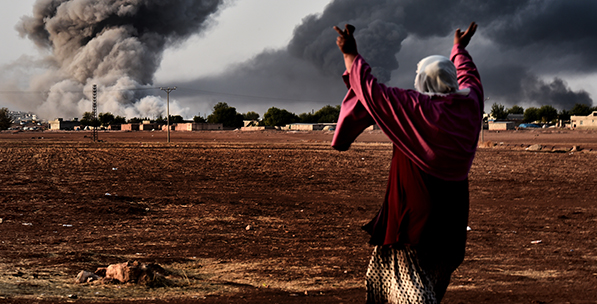The fourth year of the war in Syria is almost over. The crisis, which started with massacres by the regime of President Bashar Assad, became a civil war with heavy costs. In addition to this heated war environment, the Syrian crisis created an atmosphere of a cold war that has spread from the Middle East to the rest of the world. We cannot state that the new cold war is taking place between two opposite camps that categorically regard and exclude one another as enemies. It is also not possible to claim that the existing dichotomy is based on ideological grounds. None of the actors in the field are hardliners involved in a power struggle. In the last four years of this cold war sides have frequently changed their positions.
No matter what is said, it is not easy to stay out of this new cold war. The most important reason for this is the deepening medium of heated encounters. This conflict environment is not just a regional problem - it is a central issue that has an impact on global power struggles.
Without doubt, Turkey is the country suffering the most negative effects of these heated encounters. Turkey has been involved in the Syrian crisis as "a neighboring country sharing a border" with Syria. As a neighboring country, it has had to undertake the greatest share of the burden of the crisis in Syria. Turkey has opened its doors to about 2 million Syrian refugees. What is more, the Syrian crisis has introduced risks to Turkey's democratization and normalization processes. The Kurdish question and the Alevi issue have had to be discussed on new grounds taking into account the new risks and threats in the aftermath of the Syrian crisis.
As I have said above, it is difficult for Turkey to disengage from this new Syrian-centered cold war environment. Turkey has tried to do so, but has failed and has been transformed into one of the leading actors in this environment. From the beginning the source of the problem has been that the countries that allied themselves with Turkey subsequently changed their positions, or insisted on adopting the position of "no policy on Syria," the result has not changed.
Indeed, why has this occurred? If we answer this question through the prevailing images in the international media, the picture is not in the least bit pleasant. The perception of Turkey's attitude on the Syrian crisis that has dominated the international media is that it has been involved in the crisis unnecessarily, adopted a hardline position and has provided assistance beyond measure to the Syrian opposition. This prevalent perception has been strengthened recently by untruthful allegations that Turkey supports the Islamic State of Iraq and al-Sham (ISIS).
If we do not look for the ideological residue behind such popular media images, we may arrive at general pseudo-truths. Not conducting a reappraisal or a review would mean being an instrument of continuing propaganda targeting Turkey. Indeed, Turkey could not manage to stay out of the new Syria-centered cold war environment despite all its efforts. There are three important reasons for this. First, there are Turkey's efforts to sustain its agenda of democratization and normalization, second, Turkey's new foreign policy vision and third, the excessive pragmatism in the policies of Western states, particularly of the U.S., on Syria.
If Turkey did not have the first two reasons, then it would not have resisted Western countries' changing attitudes on a daily basis stemming from their excessive pragmatism. But if this had been the case, could Turkey have kept out of this new cold war atmosphere in Syria? My answer is no. Turkey could not have done it, but at least, as a primary actor, Turkey would not have been discriminated against either. Turkey, as a dependent actor, would still have stayed in the new cold war environment and continued to be vulnerable to its negative impacts.
[Daily Sabah, March 12, 2015]









